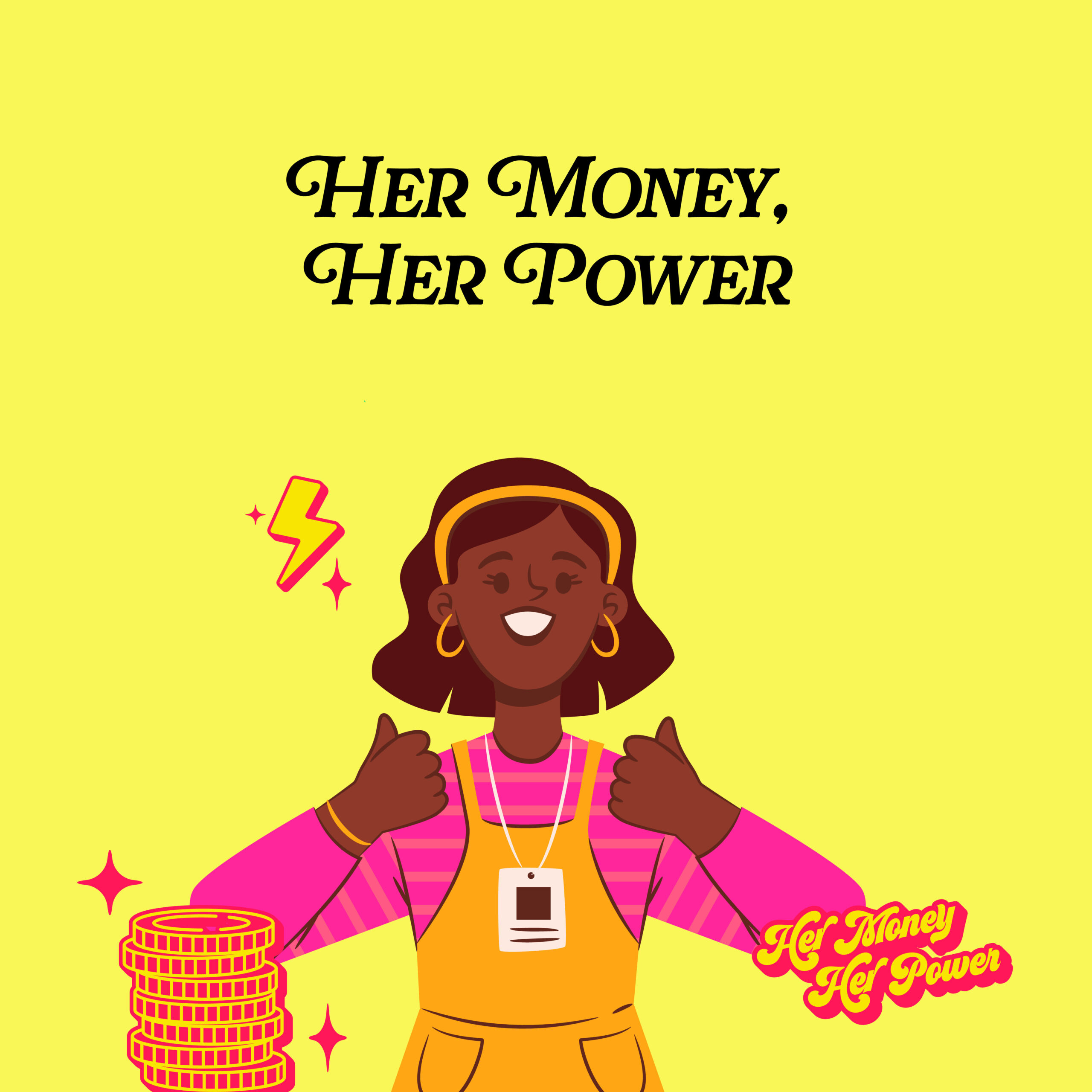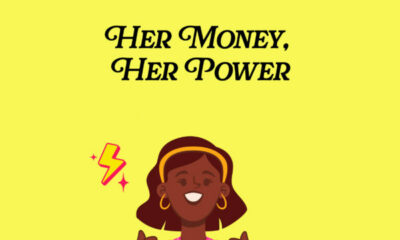Features
Women, Money, Power: Understanding BellaNaija and The She Tank’s #HerMoneyHerPower Campaign
My money, my power means I have a voice that is loud, clear and can make changes…

In 2017, when Kauna was preparing to get married, her husband suggested she leave her job to focus on the home they planned to build together. “The job wasn’t paying so well, so it was an easy decision to make at the time. He was also financially okay and it looked like the best decision to take care of the home while he solely brought the income.” 6 years down the line, her husband lost his job and things went south. “In hindsight, quitting my job was a poor decision on my part. Because when he lost his, I felt utterly powerless. There was nothing from me that we could fall back on.” Things have slowly picked up for Kauna and her family, but Kauna says she does not feel like she has economic power as a woman, “For you to feel economically powerful in your home and beyond, you must have something to call your own. Something that generates an income, something to keep your boat afloat and running. I don’t have that right now.”
A study by the United Nations Women shows that just over half (52.1%) of married women, aged 25 to 54, are in the labour force, compared to married men, who show the highest rate of labour force participation, at 96.1%. It is not uncommon for women to sacrifice their career as they grow in order to tend to their families. Sometimes, it comes down to societal expectations for women to prioritise family care over career advancement – factors like early child marriage hampers women’s ability to participate fully in the labour market and achieve long-term economic values. Other times, it is due to an unfavourable work environment that does not take cognizance of the needs of working mothers, like Adenike who had to leave her job four months after having her first baby.
“My first birth was so traumatic. I had a caesarean section that got infected and wasn’t healing. So it took a long time for me to recuperate. It didn’t help that I had little to no support in the home front so by the time I resumed work, it was tough. I consistently felt overwhelmed and sick. I stayed for four months but in the fifth month, I woke up one morning and turned in my resignation letter.
Within 5 years, I had 2 more children but I felt a part of myself chip away as the years went by. In between marriage, childbirth and home care, I had lost my essence. One day, I woke up feeling powerless and full of self-pity. I felt like I was losing control of my life and needed to find myself. So I went to the barber’s shop, cut my hair and changed the colour to wine. I also did something more; I enrolled in a baking class, and after 9 months of training, I opened a pastry store. Now, I feel like I know who I am beyond being a mother and wife.”
In 2022, Jessica Heagren conducted a survey to find out how women fared, career-wise after having babies. This survey showed that “98% of women want to work after they have children. However, the set-up of most workplaces makes working alongside having a family incredibly difficult.” 85% of the surveyed mothers left the full-time workforce within 3 years of having their first child. 19% left altogether.
For many women, building a career is beyond making money. It’s about personal growth, societal impact, and having a sense of fulfilment. It’s a journey of self-discovery, leadership development, creating a meaningful identity, and having a voice. A woman with economic power has agency and control over decisions, including how she earns an income, and how she manages her money, assets, and business. True economic power depends not only on a woman’s ability to access a livelihood, but also on her ability to control it. When a woman has economic power, she influences generations to come positively, like Ada’s mother who not only built something for herself but influenced the women in her circle.
“I saw how hard my mother worked and how much our family was better for it. As a child, all I wanted was to wear suit jackets and heels, hold my office bag and go to work like her. But I also watched her go for her PhD, build houses and amass properties for herself. I saw how much my family was better for it, how she influenced women in her circle to push for more. I saw the power and influence she wielded in my family and beyond. So it was a no-brainer that I was going to tow that path. Even as a single lady, I can see the difference in my economic power now compared to, say, 8 years ago when I was dependent on my parents” – Ada.
What does it mean to have economic power as a woman?
“It is having my own money. Something I worked for. It gives me a sense of accomplishment – that my brain and hands can produce this. That I can do whatever I set my mind and hands to do and in turn, it can make me an income” – Adenike.
“For me, it would be about self-sufficiency. Not being utterly dependent on another person for sustenance” – Kauna.
“Having economic power is having enough money to do what I want to do when I want to do it. To decide where I want to work, choose the job I want to do because it aligns with my interests. To pursue my dreams and provide for my family without overthinking. It is being able to invest properly and start a trust fund for my children, ensuring their future is secure” – Ada.
Women’s economic power is a woman’s ability to participate fully and equally in the economic sphere. It means women having access to the resources and systems that create prosperity. Access to education systems, business loans and the job market. It also means having control over resources, time, lives, and bodies. It means an increased voice and meaningful participation in economic decision-making at all levels – from the household to global institutions.
To have economic power is to have influence and control over one’s resources. It is having a choice to decide who to be and how to live. It is the power to make and act on economic decisions to ensure short and long-term success. It is having autonomy and control over everything that concerns you – from your finances to reproductive health, career, relationships, social participation and wealth.
Unfortunately, many women in Nigeria and beyond cannot reach their full economic potential due to challenges like gender inequality, limited access to education and finance, cultural and political barriers that hold them back. As of 2022, 7.6 million girls were out-of-school in Nigeria: 3.9 million at the primary and 3.7 million at the junior secondary level 1, and more than 50% of girls were not attending school at the basic education level, according to UNICEF. Politically, women’s political participation in Nigeria has remained an average of 6.7 percent in elective and appointive positions. Financially, women are still excluded. One billion women around the world remain outside the financial system, lacking access to services as simple as a savings account. 30% (17 million) of women in Nigeria were excluded from formal and informal financial services compared to 21% of men, according to the EFInA A2F 2023 survey. 37 percent of women had a bank account in Sub-Saharan Africa as of 2020, compared with 48 percent of men. There’s currently a $42 billion finance gap for women entrepreneurs due to challenges in accessing credit in Africa.
Investing in women does not only benefit women, it is good for families, communities, and global economies. For Instance, Nigeria’s GDP (Gross Domestic Product) per capita could grow by 1 1⁄4 percent if more women had access to credit. But deep-rooted societal norms, stereotypes and prevailing patriarchal gender norms across the country play a role in limiting women’s opportunities and economic participation. Women are still underreported in Nigerian media. Many people still hold on to the belief that men make better leaders than women, and limiting gender roles for women is still deeply entrenched in our society.
However, there is a silver lining. Nigeria currently has the world’s highest proportion of activity by women entrepreneurs, comprising a remarkable 23 million women who command 41% of micro-businesses.
Her Money, Her Power
To have economic power is to not have my voice stifled, especially when it comes to making financial decisions in my home. My money, my power means I have a voice that is loud, clear and can make changes even in my family – Kauna.
Whether I have money or not, I have a voice in society. My money, my power means economic agency. It means not being restricted or forced to accept things because I have no choice. With money, I can move things, I can make things happen, I can even make things ‘unhappen’ – Ada.
The power of my own money is the sense of accomplishment and fulfilment it brings me. Even though my business is still very young, sometimes I wake up feeling like I can change the world. At least, I can change my world – Adenike
BellaNaija and The She Tank have launched #HerMoneyHerPower campaign to spark a national dialogue and positively shift mindsets about women’s economic power in Nigeria through the power of media and entertainment.
For the next three (3) months, we’ll have conversations about women’s economic power and its role in promoting gender equality in our society. We believe that women having economic power is important to societal progress, and by launching the #HerMoneyHerPower campaign, BellaNaija and The She Tank will ignite a nationwide conversation about the importance of women’s financial independence and equality. When women have economic power, the overall economic prosperity of our nation will improve. We are challenging stereotypes, inspiring action, and creating a more equitable future for Nigerian women and the society at large through the power of media and entertainment.
To join the conversation and stay updated on all Her Money Her Power content, follow @bellanaija and @theshetank across all social media platforms. Also follow the hashtag: #HerMoneyHerPower.
***
All names are pseudonyms.























